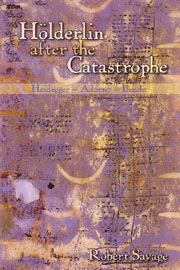Book contents
3 - Citation: Brecht, Die Antigone des Sophokles
Published online by Cambridge University Press: 05 February 2013
Summary
Wir träumen von Originalität und Selbstständigkeit, wir glauben lauter Neues zu sagen, und alles dies ist doch Reaktion, eine milde Rache gegen die Knechtschaft, womit wir uns verhalten gegen das Altertum.
[We dream of originality and autonomy; we believe we are saying all kinds of new things and, still, all this is reaction, a mild revenge against the slavery with which we have behaved toward antiquity.]
— Hölderlin, “Der Gesichtspunkt aus dem wir das Altertum anzusehen haben” (The Perspective from Which We Have to Look at Antiquity)ON 31 OCTOBER 1947, WHILE HEIDEGGER was still laboring on his “Abendländisches Gespräch,” Bertolt Brecht boarded a plane from New York bound for Paris, never to set foot on American soil again. He was glad to be leaving. The six years he had spent there had been lean ones, embittered first by the sense of impotence and frustration shared by every exile, then by the wave of anti-Communist hysteria that followed upon the euphoria of Allied victory. On the day before his flight he had been summoned to Washington by the House Committee for Un-American Activities to face questions about his political affiliations and those of his friends. One journalist described his testimony as a “smokescreen,” claiming his thick accent and evasive answers had mystified his interrogators. Brecht cut out the article and pasted it proudly in his work journal. The experience convinced him that he had long outstayed his welcome, and he resolved to leave immediately, despite not yet having been granted authorization to enter occupied Germany.
- Type
- Chapter
- Information
- Hölderlin after the CatastropheHeidegger - Adorno - Brecht, pp. 150 - 193Publisher: Boydell & BrewerPrint publication year: 2008



